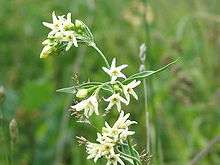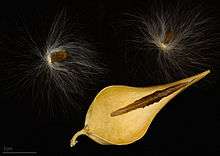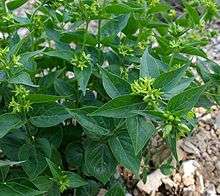Vincetoxicum hirundinaria
| Vincetoxicum hirundinaria | |
|---|---|
 | |
| Scientific classification | |
| Kingdom: | Plantae |
| (unranked): | Angiosperms |
| (unranked): | Eudicots |
| (unranked): | Asterids |
| Order: | Gentianales |
| Family: | Apocynaceae |
| Genus: | Vincetoxicum |
| Species: | V. hirundinaria Medik. |
| Binomial name | |
| Vincetoxicum hirundinaria | |
| Synonyms | |
|
Asclepias vincetoxiucum L. | |

Vincetoxicum hirundinaria - MHNT
Vincetoxicum hirundinaria, commonly named white swallow-wort (its seedpods are reminiscent of a swallow's wing, or tail), is a long-lived herbaceous perennial of the genus Vincetoxicum in the family Apocynaceae. It is native to cliffs and slopes, especially in calcareous soils, of continental Eurasia (including some Baltic islands).[2] There are introduced populations in North America (Ontario, Michigan, and New York).[1]
The plant was mentioned by Pedanius Dioscorides as a traditional plant used by Dacians and known as "ZOO-USTE", the "herb of animals", believed to open any locked door.[3]
References

- 1 2 "Cynanchum vincetoxicum (L.) Pers.".
- ↑ Leimu, R (Jan 2004). "Variation in the mating system of Vincetoxicum hirundinaria (Asclepiadaceae) in peripherial island populations" (Free full text). Annals of Botany. 93 (1): 107–13. doi:10.1093/aob/mch012. ISSN 0305-7364. PMID 14678943.
- ↑ Bucurescu, Adrian (22 August 2012). "Iarba fiarelor". The Epoch Times, Romania. Retrieved 24 March 2013.
External links
 Media related to Vincetoxicum hirundinaria at Wikimedia Commons
Media related to Vincetoxicum hirundinaria at Wikimedia Commons Data related to Vincetoxicum hirundinaria at Wikispecies
Data related to Vincetoxicum hirundinaria at Wikispecies
This article is issued from Wikipedia - version of the 9/17/2016. The text is available under the Creative Commons Attribution/Share Alike but additional terms may apply for the media files.